🌍 On 05th March 2025, WISE will organise the largest multi-lingual online event ever held in Europe on energy poverty, women and the right to energy!
In 2022, over 41 million Europeans were unable to keep their homes adequately warm. Energy poverty is a multi-dimensional phenomenon, considered to be caused by a combination of low income, poor energy efficiency in buildings and high energy expenses.
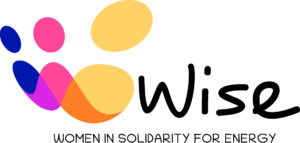 💬 In March 2025, WISE will host its first and only Pan-European Online Event, entitled Translating Women’s Right to Energy Across Europe. The aim is the participation of 300 persons in Europe-wide discussions on how to best translate women’s ‘right to energy’ under the EU Pillar of Social Rights into various local and national policy contexts, in gender-sensitive manners.
💬 In March 2025, WISE will host its first and only Pan-European Online Event, entitled Translating Women’s Right to Energy Across Europe. The aim is the participation of 300 persons in Europe-wide discussions on how to best translate women’s ‘right to energy’ under the EU Pillar of Social Rights into various local and national policy contexts, in gender-sensitive manners.
Registration link here: https://lnkd.in/ePp3c9id
Full programme here: https://lnkd.in/eJHTrN9C
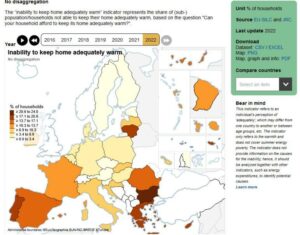 🚀 This two-hour online event offers an exceptional opportunity for participants to educate themselves about the right to energy of women across Europe. They will also be able to:
🚀 This two-hour online event offers an exceptional opportunity for participants to educate themselves about the right to energy of women across Europe. They will also be able to:
● Collectively engage with multi-lingual materials that promote clean, affordable energy for women as a basic human right, in line with principles of a just, clean energy transition.
● Identify opportunities for translating the right to clean and affordable energy for women across Europe in local and national policies, in gender-sensitive manners, with attention to the needs of migrants and most vulnerable groups of women.
🎯With Women in Solidarity for Energy (WISE), every word counts! An action of energy solidarity in which EVERYONE can participate! The challenge: Many key pieces of content to support women in #energypoverty already exist… but only in English! Now, WISE tries to make them accessible to everyone in many different (more than 25) languages! WISE is aiming to attract more than 300 participants from all over Europe. In 25 parallel break-out sessions participants will discuss gender and energy poverty and women’s right to energy in their own language or in English. Topics for discussion include gender and just energy transition, energy poverty amongst migrant and minority women, students and young women, elderly women, solid fuel use amongst women in Global North and South, minimum use of energy, disconnection bans, prepayment meters, and inclusive energy literacy.
👉 Wednesday, February 5th: Join the launch webinar and learn all about the project!
🔗Register now ➡️ https://lnkd.in/e8tJ2JU6
Marina Varvesi | Federica Ragazzo | Federica Petraroli | Alice Corovessi | Eleni Papadopoulou | Ana Stojilovska | Sára Szabó Paula D. | Nikos Chrysogelos | Milena Stateva | Marlies Hesselman | Marielle Feenstra | Willemijn BloemOnWomen in Solidarity for Energy (WISE) Groningen Centre of Energy Law and Sustainability (GCELS) Marilyn Smith Marielle Feenstra Ana Stojilovska Alejandra Lozano Rubello Irene González Pijuan María José Aldanas Anna Zsofia Bajomi, Dr. Nthabiseng Mohlakoana, PhD Houria Tourich Batoul Mesdaghi
————————————————————————————————————————————-
More about energy poverty:
https://energy.ec.europa.eu/topics/markets-and-consumers/energy-consumers-and-prosumers/energy-poverty_en
—————————————————————————————————————————————
A full overview of sessions is found below.
Preliminary Agenda
15:00 – 15:10: Welcome, Introduction of the WISE project
Marilyn Smith, The Energy Action Project (EnAct)
15:10 –15:15: Ice-Breakers
● Where are people attending from?
● Do you think the EU protects the right to energy?
● What does the right to energy mean to you?
15:15 –15:25: Why women’s right to energy?
A gender perspective on European energy poverty
Marielle Feenstra | 75inQ
● Right to Energy in EU Pillar of Social Rights
● Some key statistics / issues on gender and energy poverty in EU
15:20 – 15:40: Translating Women’s Rights to Energy Across Europe
Marlies Hesselman | Faculty of Law, University of Groningen
● Results from the WISE Translate-A-Thon
● Materials for Promoting Women’s Rights to Energy in Europe
● What is the Right to Energy? Right to Energy Toolkit
● How is and can the Right to Energy be Promoted across Europe?
● Join us for a Discussion!
15:40 –15:45 Introduction of the Breakout Groups
Choose one of 25 Parallel Break-Out Groups in English or Other Language
Multi-lingual sessions
English language sessions below!
Translating the Right to Energy for Women Across Europe!
In many sessions, participants will discuss how to best use available WISE materials to translate women’s right to energy and energy poverty alleviation measures into locally relevant languages, national and cultural contexts, with attention to gender-based sensitivities. Participants will learn more and discuss specifically about questions such as:
● What may women’s right to energy mean in your national context?
● How to translate relevant ‘right to energy’ concepts in national languages and practices, including in cultural and gender-sensitive manners?
● What are priority tips or actions for promoting women’s right to energy?
1. Translating the Right to Energy for Women in Bulgaria (български)
2. Translating the Right to Energy for Women in Croatia (Hrvatski)
3. Translating the Right to Energy for Women in Denmark (Dansk)
4. Translating the Right to Energy for Women in Finland (Suomea)
5. Translating the Right to Energy for Women in France (Français)
6. Translating the Right to Energy for Women in Germany (Deutsch)
7. Translating the Right to Energy for Women in Greece (ελληνικά)
8. Translating the Right to Energy for Women in Hungary (Magyar)
9. Translating the Right to Energy for Women in Italy (Italiano)
10. Translating the Right to Energy for Women in Netherlands (Nederlands)
11. Translating the Right to Energy for Women in North-Macedonia
12. Translating the Right to Energy for Women in Norway (Norsk)
13. Translating the Right to Energy for Women in Poland (Polski)
14. Translating the Right to Energy for Women in Portugal (Português)
15. Translating the Right to Energy for Women in Romanian (Română)
16. Translating the Right to Energy for Women in Slovakia (Slovenský)
17. Translating the Right to Energy for Women in Spain (Español)
18. Translating the Right to Energy for Women in Sweden (Svenska)
19. Translating the Right to Energy for Ukrainian Women (українська)
20. Translating the Right to Energy for Arab Women (اللغة العربية)
21. Translating the Right to Energy for Roma Women (Romani)
22. Translating the Right to Energy for Turkish Women (Türkçe)
English sessions
23. Translating the Right to Energy for Migrant & Minority Women across
Europe (English)
Hosts: Houria Tourich (Language & Energy Coach Rotterdam) and Batoul
Mesdaghi (Energy Justice Scientist, TNO)
This group discusses how to best engage women from different migrant and minority backgrounds on their energy rights as related to energy poverty and participation in the energy transition. What challenges do different women face in terms of living in energy poverty, and/or participating in the transition? What are important needs and (language) barriers to tackle energy poverty and improve energy (rights) literacy? How important is it to speak the right “cultural language”?
How to engage women with a diversity of backgrounds? Come and discuss in this breakout session, hosted by expert women with lots of experience and insights on these questions.
24. Translating the Right to Energy for Older Single Women across Europe
(English)
Host: Artemis Westenberg (Dutch Association for Women’s Rights)
This group discusses how to best engage older women across Europe on their rights to energy. What types of direct or indirect discrimination do older women in Europe experience when it comes to their energy consumption, bills, income/pension gaps or housing situations? How is this captured in the language of women’s rights? How to empower older women with targeted rights-based programmes or policies? Come and discuss the lived experiences of older women across Europe,
25. Translating the Right to Energy for Students and Young Persons across
Europe (English) Host: European Youth Energy Network
This group discusses how to best engage or educate students and young persons living independently, in precarious (rental) housing or in shared housing, on their energy rights. Are students and young persons across Europe facing inequality or discrimination when it comes to their energy consumption, bills, income status and housing situation? How to enforce tenant rights vis-a-vis landlords? How to empower students and young people as future energy consumers? How to speak young persons‘language’ when it comes to engaging them on energy solidarity, clean transition and the right to energy?
26. Women’s Right To Energy Across Global North and South: Solid Fuel Cooking and Heating (English)
Hosts: Anna Bajomi (FEANTSA); Nthabi Mohlakoana (TU Delft); Teresa Cuerdo Vilches (Spanish National Research Council – CSIC). This group compares practices of solid fuel use by women in households across Global North and Global South, with a special focus on Europe, Latin-America and Africa. Globally still 2.1 billion persons rely on solid fuels for heating, cooking and lighting, including a substantial number across Europe. This includes fuels such as wood, coal, dung, but also plastics. Household solid fuel use is widely understood to impact women disproportionately. How is their health harmed by such practices? Is this a matter of the right to energy, for example under the UN Women’s Rights Convention or EU Pillar of Social Rights? What could and should be done to phase out household solid fuel use? Which type of fuels should be prioritised? How to achieve inclusive transitions to clean, affordable, healthy energy services?
27. Women's Right To Energy: Gender Equality, Human Rights and Just
Energy Transition Principles (English)
Host::Alejandra Lozano (GI-ESCR)
This group discusses key principles for the just energy transition from a perspective of human rights and gender. The room is led by GI-ESCR, which is currently actively developing a set of new global principles for the gender-just energy transition, including phase out of harmful fossil fuels, women’s right to energy, women’s participation in the energy transition, and decent work. This group will take a closer look at relevant human rights principles and discuss how they can be put in practice as well as guide further activism across Europe.
28. Women’s Right to Energy: Banning Household Energy Disconnections
(English)
Host: Maria Jose Aldanas (FEANTSA)
This group will specifically discuss household energy disconnections as a violation of human rights, including the right to energy and the right to adequate housing. It will debate how households, including women-led households, boys and girls are negatively affected by power cuts, and what types of protections can be put in place. The group discusses recent developments in human rights case- law as well as ongoing implementation of new EU legislation that obliges EU Member States to prevent disconnections amongst European households. How can women benefit from such legal developments?
29. Translating Women's Right to Energy to Pre-payment and Budget
Meters: A minimum right to energy? (English)
Hosts: Sam Foley (University of Groningen)
This group critically discusses the practice of prepayment and budget energy meters, which are used in several EU countries to deal with arrears, including in Ireland, UK and France. In some countries, ‘power limiters’ are also used. Are such practices in line with the idea of a right to affordable basic energy services for all, including vulnerable households and female-headed households, with children? How to deal with self-disconnections? What is a minimum right to energy? This group discusses the practice of prepayment, budget meters and limiters from a perspective of women’s right to energy services of a certain quality.
30. Translating Women & Right to Energy: Enhancing Women’s Energy
Literacy in an Inclusive Manner (English)
Hosts: Marilyn Smith (EnAct) / t.b.c.
Women have a right to information about their energy consumption and the energy bill. However, many people are not sufficiently ‘Energy Literate’. How does energy (il)literacy affect women and men differently? Is information about energy consumption and energy transition reaching everyone equally? This group gathers and discusses alternative ideas for accessible and inclusive energy literacy materials; e.g. visuals, art, music, audio, video, theater and other forms of expression. What is the role of educational peer-to-peer women’s initiatives and Suggestions for suitable information or education campaigns? How to improve literacy on women’s energy rights?
16:40 –16:55 Plenary: Wrap-Up Session
During the plenary wrap-up we may hear from some break-out rooms on their main activities, insights and findings, as well as recommendations for the WISE project going forward. All information from the Breakout Rooms will be collected as part of the Translate-A-Thon effort and be used to guide further development and implementation of our project activities.These activities will include training for women across WISE target groups, film screenings, awareness and discussion events, solidarity days and story-telling workshops.
We also hope to generate new knowledge, insights and ideas for people to put into practice themselves.
16:55 – 17:15 Lessons learned & looking forward: How to engage with WISE after today?
● WISE future activities:
○ film events / discussion evenings
○ dissemination of Translate-a-Thon materials
○ solidarity days
○ story-telling
○ closing event
● EU CERV Questionnaire
WISE Consortium Partners
🌍 Bulgaria / The Orion Grid
The Orion Grid works for a democratic and caring world free from oppression and trauma, where autonomous individuals-in-communities can develop and enable everyone to participate fully in social and political life. The organisation works by amplifying and bringing together the energy of the bearers of the democratic impulse. We commit ourselves to: a)democratisation of political and socio-psychological knowledge; b) specific support to individuals, organisations and movements to address challenges and unlock their potential as democratic actors; and c) identifying and addressing fissures at the community and systemic levels through educational, consultative, artistic, public and other interventions.
Orion Grid provides three main services: a) consultations (one-off and on-going), both organisational and group (process facilitation to address blockages, problem solving and organisational development) and individual (coaching and role analysis); b) education related to feminist epistemologies; democratic, civic and political education; training for facilitators; training for primary psychological care; and digital skills; and c) research including monitoring and evaluation of social systems and institutions; developments on grid theory and practice; and socially and politically significant issues through mixed methodology. Orion Grid’s focus is on tackling the most pressing issues faced by Bulgarian society, especially climate change communication, gender-based violence, far-right trends, discrimination, blockages in the processes of migration, structural and systemic violence.
🌍 Croatia / Green Energy Cooperative (ZEZ)
Green Energy Cooperative (ZEZ) is a non-profit cooperative & social enterprise based in Zagreb. It focuses on community renewable energy projects and empowering local communities. Established in 2013 as part of the project Development of Energy Cooperatives in Croatia implemented by the United Nations Development Program (UNDP) in Croatia, ZEZ has been supporting community energy in Croatia and across borders. The Cooperative’s 20 members have vast experience in coordinating and working in green energy projects and energy poverty on European and domestic scale, as well as on developing projects, designing policy recommendations and carrying out educational activities. ZEZ has an excellent background in the energy sector and understanding of the complex interactions of energy and economy, society and the environment. ZEZ promotes active involvement of stakeholders, particularly policy makers and citizen groups, in policy elaboration and implementation processes. The cooperative has a large network of specialists to carry out the research, innovation activities and implementation of solar PV projects. Its approach is based on experience and professional work in the field of energetics in Croatia, the Western Balkans and Central Asia.
🌍 France / The Energy Action Project (EnAct)
EnAct is internationally respected for its ability to produce engaging and informative content about energy poverty and effective means to tackle it. It has led or been directly involved in campaigns to raise awareness of access to energy as a basic human right (through podcasts and editing/ production of a Right to Energy Toolkit). EnAct has also researched and verified a wide range of energy-saving tips that all EU citizens can apply in their daily lives to use energy more wisely and participate in reducing consumption and emissions. Additionally, EnAct substantial experience in coordinating projects with multiple partners.
Notably, in relation to WISE, EnAct is focusing action in its own neighbourhood’ – the Paris suburb of Aubervilliers, the fourth poorest city in France. With a population of 95 000, citizens represent ~120 nationalities. Single mothers (mostly migrants) make up ~20% of the population and most live in social or substandard rental housing. The City of Aubervilliers is keen to collaborate to tackle widespread energy poverty among women, recognising the need to collaborate with multiple CSOs that have earned the trust of women.
🌍 Greece: Wind of Renewal/Anemos Ananeosis & INZEB
Wind of Renewal (WoR) is a social cooperative focusing on social and green innovation, the just energy transition and energy poverty, climate protection, and intercultural dialogue. Its activities boost empowerment and social inclusion. WoR has worked closely with refugee and migrant communities in Greece as well as with diverse EU social and energy networks. It has developed a community model (welcommon, which means welcome in common, together) for empowerment and inclusion through building communities to promote coexistence and dialogue among cultures, working with refugees, asylum seekers, tourists and young volunteers from 50 nationalities and ethnicities. To date, WoR has offered accommodation to 2000 refugees and empowerment and/or information education to more than 3000 refugees from 25 ethnicities and nationalities, mostly from Syria, Iran, Afghanistan, Ukraine and Africa. It has worked closely with Ukrainian women and children in Greece who have fled the Russian invasion. WoR seeks ways to create jobs or co-working opportunities related to the energy transition and sustainable living.
INZEB is a non-profit, independent organisation with a focus on a sustainable and energy- balanced future, working in the areas of: energy efficiency in buildings and the built environment; innovative financing for energy efficiency; energy poverty mitigation; and evolution of energy communities. INZEB aims are achieved through an interdisciplinary team of experts who generate and disseminate scientific insights, research results and innovative solutions. INZEB endeavours to encourage and support the constantly evolving energy sector through research, documentation, consultation, and implementation of plans and capacity building programmes for national, European and international projects. By working closely with an extensive network of EU institutions, national, regional, and local authorities, NGOs, and academic and business sectors at national, European, and international levels, INZEB has built valuable partnerships that enable knowledge exchange and empower the ability to implement, disseminate and exploit scientific-based project outcomes towards sustainable energy transition and climate change mitigation. INZEB has published numerous reports regarding energy poverty mitigation in Greece and the EU. It has an extensive track record in EU-funded projects, including POWERPOOR H2020 (2020-23). INZEB provides technical assistance to 20 municipalities in Greece (5 technical assistance contracts) for diagnosing energy poverty and organising awareness events to engage and inform citizens, civil society organizations, and the technical and social services of the local authorities, and provide the latter with options for mitigation actions.
🌍 Hungary / HUN-REN Centre for Social Sciences (CSS)
CSS is the flagship research institute of social sciences in Hungary. More than 200 researchers conduct disciplinary and interdisciplinary research in sociology, political science, computational social science, network science, minority studies, and legal studies. CSS Budapest is dedicated to building collaborative, trans-disciplinary, and cross-sectoral networks both within Hungary and internationally. The Centre regularly hosts public events, engages citizens, and conducts research with social impact. Researchers at the Centre have actively participated in EU-funded H2020 and other international projects. The Centre coordinates the H2020 Research and Innovation Action project DEMOS, which won a €3 million grant from the European Commission. The Centre also acts as a work package and task leader in several ongoing H2020 projects such as BRIDGES, OPTED, RE-DWELL, ESS-SUSTAIN-2, and RURALIZATION and leads an EEA grant (CODE Europe). In the past, CSS took part in a variety of other H2020 and FP7 projects (such as MIME, MOPACT, FAMILIES & SOCIETIES), COST actions, and Visegrad grants. In the area of energy, research includes the study: of energy poverty in Europe; the status of vulnerable groups in the energy transition; and new governance models of participation.
🌍Italy / RETE ASSIST
RETE ASSIST is a national network created to consolidate, strengthen and carry on the work started within the European ASSIST project. RETE ASSIST aims to be a point of reference for all those involved in promoting the just energy transition and the fight against energy poverty. RETE ASSIST proposes multi-layered, holistic approaches in line with complex and multidimensional problems, embracing aspects ranging from the social to the technical.
RETE ASSIST is the result of a research path carried out to define, test and subsequently scale an innovative model to address the problem of energy poverty. The ASSIST model is based on awareness that energy poverty does not fall exclusively within the energy sphere but has causes and consequences with strong social connotations. SMART-UP, a European project (H2020), has considered social workers – who already provide assistance to peopl in socio-economic difficulties – as potentially suitable to provide direct support on problems connected to the energy sphere, such as the inability to pay energy bills or living with only partial satisfaction of one’s energy needs. SMART-UP trained social workers on energy issues and integrated their knowledge on technical issues, thus developing their assistance skills on energy poverty. The SMART-UP experience concluded that helping people in energy poverty requires both knowledge and soft skills. The latter includes empathic sensitivity, the ability to dialogue and to transmit trust. In turn, the ASSIST project profiled
TED and built the TED-centric model for tackling energy poverty and improving the conditions of people in vulnerable/energy poor conditions. The project concluded that the TED, with horizontal skills on social and communication issues, and with vertical skills strengthened on a technical level, is a key player in the fight against energy poverty.
🌍 The Netherlands / 75inQ & University of Groningen, Faculty of Law
The 75inQ Foundation accelerates the transition to sustainable energy by promoting gender equality in line with the UN Sustainable Development Goals. It specifically focuses on the convergence of SDG7 and SDG5; the crossroads of the transition to sustainable and affordable energy and gender equality. These goals converge from the boardroom to the living room; i. Boardrooms within the energy sector are dominated by male directors; ii. Consequences of energy poverty are predominantly borne by women; iii. The gender component in the energy transition becomes more visible when the growing labour shortage and faltering labour participation in the energy sectors are viewed through a gender lens as a result of which innovation, strength and speed lag behind the ambitions of the Paris Agreement and reduce CO2 emissions. 75inQ has a membership community of over 700 female professionals working in the energy sector. 75inQ has written policy reports for the JRC of the EU, the Femm committee of the EU, EIGE, the UN, Asian Development Bank, Ministries of the Netherlands and ActionAid.
The University of Groningen is one of the oldest and largest universities of the Netherlands. Its Faculty of Law comprises six law departments and is well-known for highly-ranked bachelor and master programmes in the areas of Public International Law, Human Rights and Energy and Climate Law. At the Transboundary Legal Studies (TLS) Department, researchers investigate key transnational legal challenges and boundaries of law in the 21st century. In a highly technological and strongly internationalising society, many complex social issues and problems now transcend borders, including questions of achieving a (just) energy transition, climate action, protecting human rights and environmental health. One-dimensional approaches to such challenges and related legal questions are often no longer possible: cooperation with other disciplines and with those working in practice is vital. The Faculty is home to the Groningen Center for Energy and Sustainability Law and Groningen Center for Health Law, the latter also strongly focusing on the underlying determinants of physical and mental health, such as decent housing, access to water, energy and clean air – with a strong correlation to energy poverty. Dr. Marlies Hesselman specifically studies the emerging legal mobilization around the notion of the right to energy and she regularly advises on recent legal developments to national, EU, UN and other international institutions, and cooperates closely with civil society.
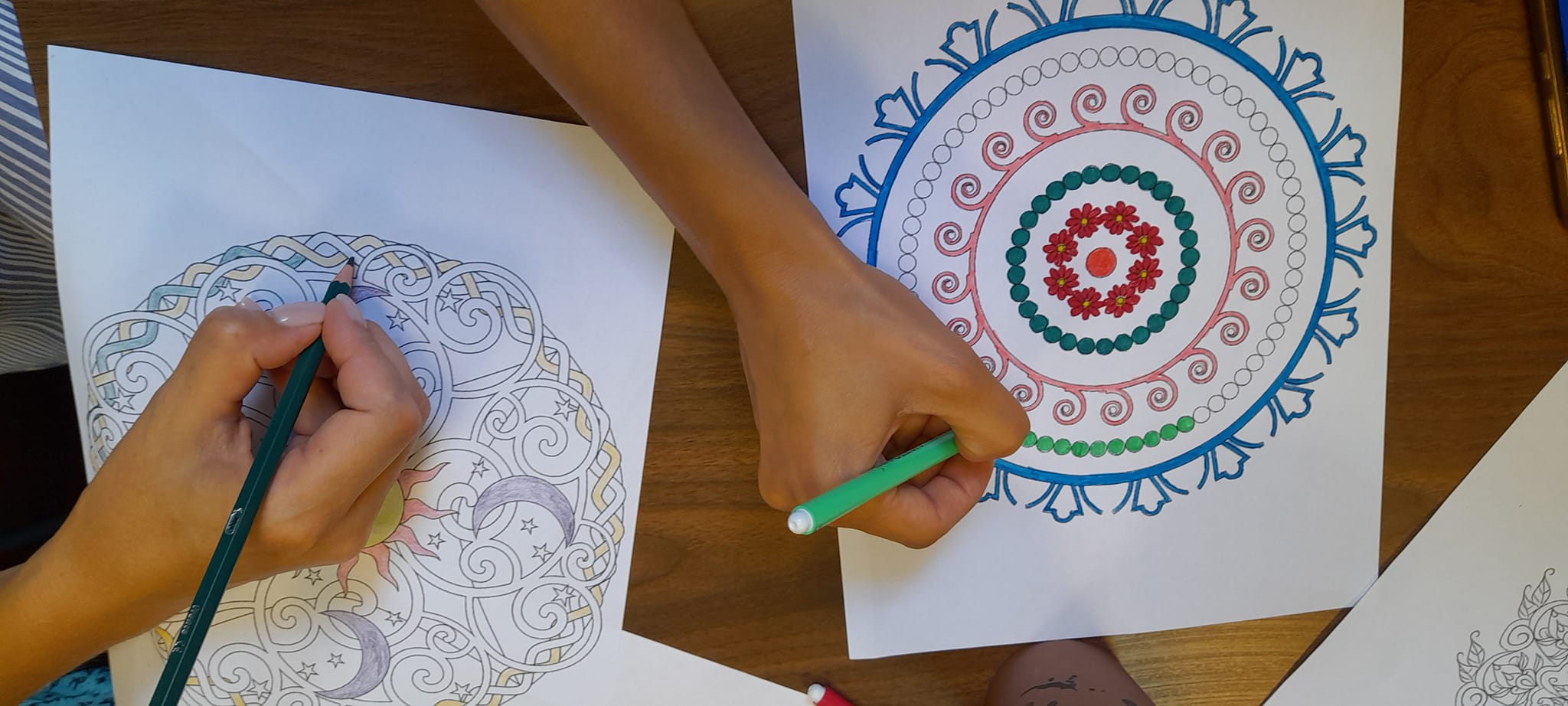


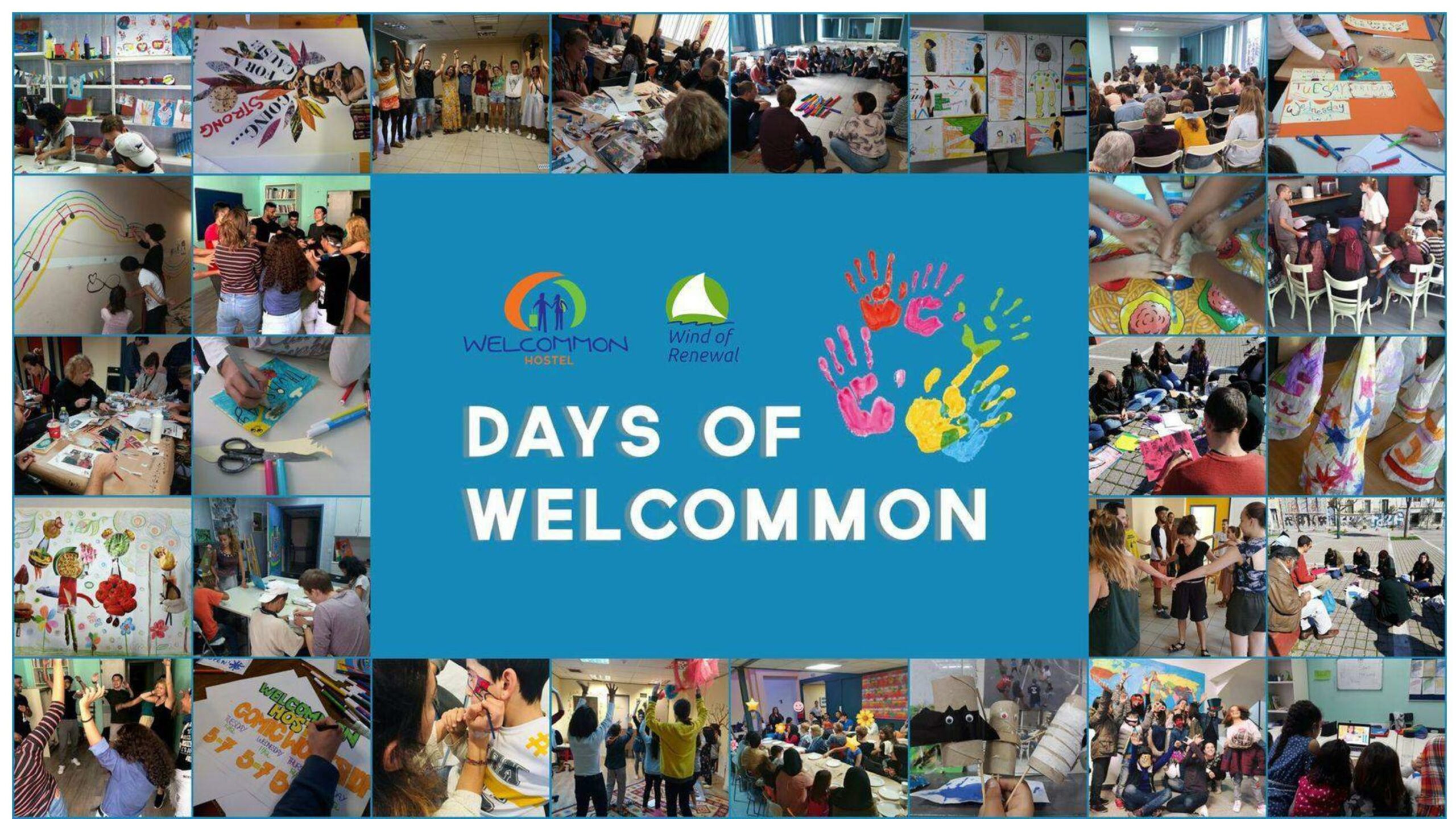
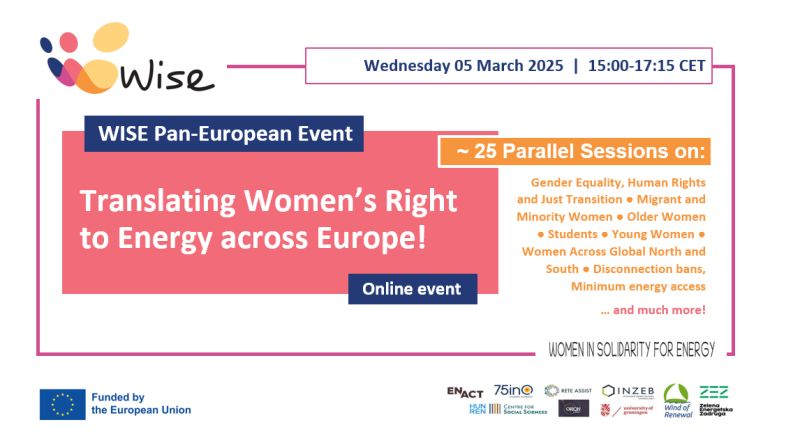
 💬 In March 2025, WISE will host its first and only Pan-European Online Event, entitled Translating Women’s Right to Energy Across Europe. The aim is the participation of 300 persons in Europe-wide discussions on how to best translate women’s ‘right to energy’ under the EU Pillar of Social Rights into various local and national policy contexts, in gender-sensitive manners.
💬 In March 2025, WISE will host its first and only Pan-European Online Event, entitled Translating Women’s Right to Energy Across Europe. The aim is the participation of 300 persons in Europe-wide discussions on how to best translate women’s ‘right to energy’ under the EU Pillar of Social Rights into various local and national policy contexts, in gender-sensitive manners. 🚀 This two-hour online event offers an exceptional opportunity for participants to educate themselves about the right to energy of women across Europe. They will also be able to:
🚀 This two-hour online event offers an exceptional opportunity for participants to educate themselves about the right to energy of women across Europe. They will also be able to:
Recent Comments